Pomegranate - norms of consumption per day, is it possible to eat with seeds
In the autumn-winter period, when the choice of vegetables and fruits is limited and at the same time most of them have lost their nutrients during the winter or are grown in greenhouses with the addition of large doses of nitrates, pomegranate comes to the rescue. The fruit contains vitamins and minerals needed to maintain overall health and wellness, tastes great and is affordable.
To get the most out of it, it is important to know how much pomegranate you can eat per day, in what quantity, with or without seeds, what are the contraindications for use.
The content of the article
What is pomegranate
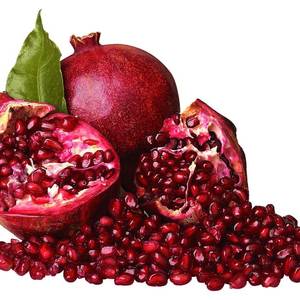
Pomegranate is a plant from the Pomegranate genus of the Derbennikovye family, with edible fruits. Place of origin - Asia. Today, pomegranate is widely grown in the Caucasus, the Mediterranean, the Middle East, in some regions of Asia, northern and tropical Africa.
It is a perennial tree with a subtropical climate. Lives for about 50-60 years, after which the yield decreases and the old plantings are replaced with new ones. An average of 50-60 kg is harvested from one tree. The biological period of maturation in nature is extended: in the regions of the northern hemisphere it is September-February, in the southern hemisphere - March-May.
For reference. As it ripens, the color of the fruit does not change, making it difficult to determine when to harvest. If the fruits are unripe, they are left to ripen, keeping an air humidity of 80% and a temperature of + 1 ... + 2⁰С. However, during storage, the quality of the fruit practically does not change.
What is this fruit
Pomegranate is a juicy edible fruit of a tree; grains, seeds and juice are eaten, the rest of the plant (fruit peel, bark of roots, trunks and branches, membranous septa) are used as medicinal raw materials. Grains are eaten raw, in prepared dishes, drinks, processed into juice.
There are only two types of pomegranate in the genus - Common pomegranate and Socotransky pomegranate. In Europe, including Russia, the common pomegranate is popular. Fruits the size of an orange, covered with a peel from orange-yellow to deep red, taste sweet and sour, sour, rarely sweet. The chemical composition is also different, depending on the degree of maturity, growing conditions and storage.
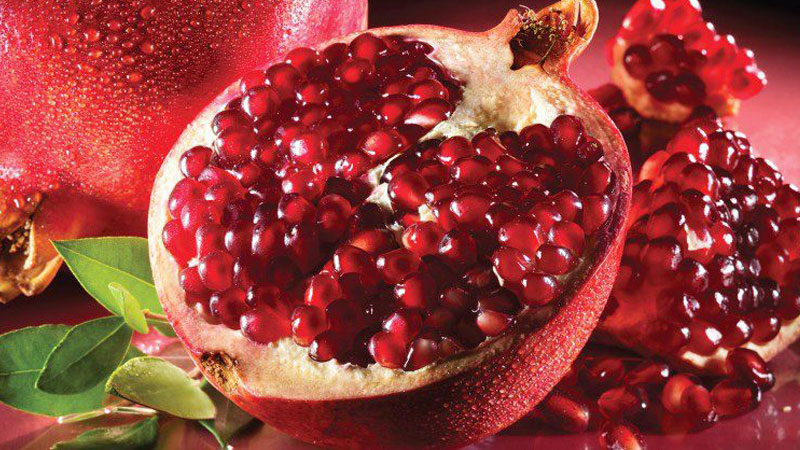
Chemical composition, vitamins and trace elements
Pomegranate is a low-calorie product. 100 g contains 72-80 kcal, proteins - 0.7 g, fats - 0.6 g, carbohydrates - 14.5 g. Nature has generously enriched the fruits with substances useful for the human body. The composition contains a diverse complex of biologically active components, including:
- omega-6;
- vitamin A;
- beta carotene;
- B vitamins: B1, B2, B3, B4, B5, B6, B9;
- vitamin C;
- vitamin E;
- vitamin H;
- vitamin K;
- vitamin PP;
- macronutrients: potassium, calcium, magnesium, sodium, sulfur, phosphorus, chlorine;
- trace elements: iron, iodine, cobalt, manganese, copper, molybdenum, selenium, fluorine, chromium, zinc.
The benefits of pomegranate
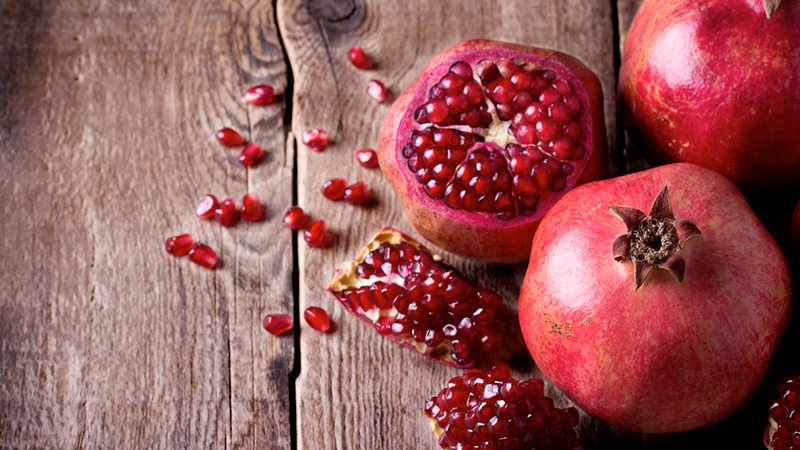
The pomegranate seeds and pulp contain many substances important for the body that provide the basic life processes:
- Urolitin A. It is a powerful antioxidant, reduces the severity of inflammation, and reduces the risk of developing cancer.
- Retinol. It slows down the aging process, accelerates the healing of wounds and damaged mucous membranes, increases the body's resistance to intestinal diseases, supports the proper functioning of the organs of vision, sweat and sebaceous glands.
- B vitamins... They improve the activity of the nervous system, activate memory and thinking processes, and increase stress resistance. They are also necessary for the normal course of growth and development of the body, proper functioning of the heart, maintaining the health of the digestive and hematopoietic systems.
- Vitamin C... It has a tonic effect, protects against infections. Ascorbic acid reduces capillary fragility and permeability, strengthens the vascular wall, which serves as a good prevention of blood clots and circulatory disorders.
- Vitamin E. Maintains youthfulness and beauty of the skin, normalizes metabolic processes in tissues, supports the activity of the gonads, lowers blood glucose levels, alleviates Parkinson's and Alzheimer's disease, and prevents the development of senile dementia.
- Amino acids (five of them are irreplaceable). They are of great importance for the normal functioning of the brain, take part in the synthesis of proteins, supply muscle tissue with energy, help vitamins and minerals to fully perform their functions.
- Cellulose. Strengthens intestinal motility, cleanses from toxins and toxins, improves digestion, activates metabolism, regulates and maintains normal microflora.
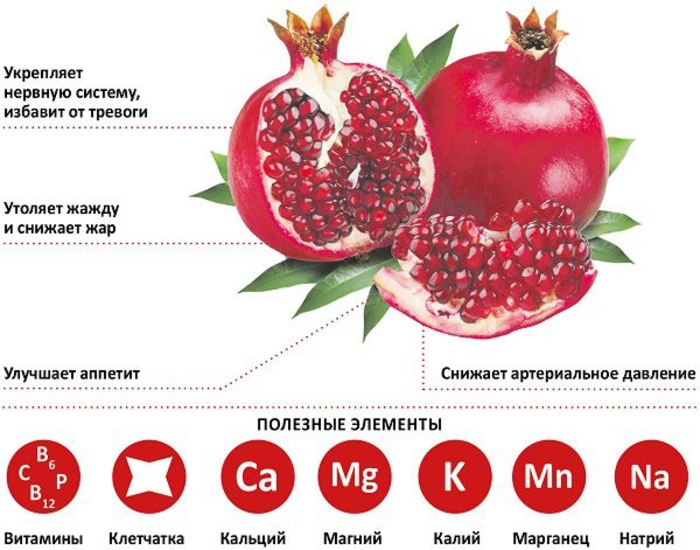
Pomegranate seeds and juice are used for the treatment and prevention of various diseases and conditions. The juice is recommended to be taken in case of anemia to increase the level of hemoglobin and the number of erythrocytes, since the vitamin K present in the composition takes part in the formation of new blood cells.
The juice relieves the severity of symptoms and prevents possible complications in diabetes mellitus, ischemia, myocardial infarction. Possessing a diuretic property, berries stabilize high blood pressure, reduce the load on the heart muscle, remove excess fluid from the body, thereby eliminating edema.
Pomegranate juice and grains promote faster recovery after operations and diseases, strengthen the immune system, accelerate tissue regeneration, serve as a source of vitamins, micro- and macroelements necessary for the body. Indications for the use of pomegranate berries include acute and chronic infectious diseases, neurological disorders, stress and overwork, vitamin deficiency, obesity, unbalanced diet.
For women
The presence of vitamins of group B, E, C, H, PP, as well as other components make pomegranate an indispensable product in the diet of women. The fruit has a positive effect on mood and health in general, has a cosmetic effect on the condition of hair and nails.
A diverse vitamin and mineral complex enriches the skin with useful substances, normalizes metabolism, reduces the appearance of cellulite, and stimulates the production of collagen. Fatty acids saturate the skin with moisture, normalize the state of membrane fats. Vitamin E protects against the negative effects of UV rays. Pomegranate restores hair structure, activates hair growth, improves the condition of nails.
The value for women is due to the presence of B vitamins, which maintain normal hormonal levels and maintain the functions of the reproductive system. Pomegranate has a general strengthening effect on the body during pre- and post-menopause, relieves the severity of symptoms such as dizziness, weakness, irritability, excessive sweating, "hot flashes".
B vitamins, together with folic acid, ensure the proper functioning of the nervous system, prevent the development of vegetative-vascular disorders. Calcium with vitamin D strengthens bone tissue, preventing the development of osteoporosis (decreased bone density).
During pregnancy

Pomegranate berries and pomegranate juice during pregnancy additionally saturate the body with minerals, fatty acids, vitamins:
- Vitamin A provides the physiological process of ovulation and the functioning of the corpus luteum.Its main task is the production of progesterone, which is necessary for the development and maintenance of pregnancy, and the prevention of menstruation.
- Pyridoxine (vitamin B6) helps with toxicosis, normalizes and supports the activity of the nervous system, promotes better absorption of vitamin B1.
- Pantothenic Acid (Vitamin B5) reduces stress manifestations, increases endurance.
- Potassium participates in the formation of bone tissue and the laying of dental elements in an infant, prevents the leaching of calcium from the mother's body.
- Zinc together with ascorbic acid, they protect the body of a woman and a fetus from the influence of free radicals, take part in the processes of growth and development of the skin.
The main value of pomegranate during the planning and bearing of a child is saturation of the body with folic acid. This element is vital both for the health of the mother and for the growth, development of tissues and organs of the fetus. It affects the appetite and mood of women, and is involved in the creation of baby cells. Folic acid deficiency can cause the development of pathologies from the nervous and cardiovascular systems in the fetus.
During breastfeeding
Pomegranate promotes active recovery of the woman's body after childbirth, makes up for the lack of vitamins and minerals in the body. Biologically active components serve as a good prevention of osteoporosis and iron deficiency anemia, increase immunity, and improve overall well-being.
Manganese in the composition of the fruit activates the reproductive functions of the female body, vitamin B improves memory and reduces irritability, which allows the body to calmly perceive the influence of external stimuli, helps to avoid or easier to endure postpartum depression.
For men
Pomegranate is no less useful for men's health. It serves as an additional source of zinc, selenium, manganese, vitamin E, which have a versatile beneficial effect on the body:
- Restore metabolic processes in the prostate gland.
- Facilitates urination.
- They enhance potency, support reproductive health, improve the quality of sperm.
- Participate in the development of muscle tissue.
- Increase vitality, endurance and performance.
Possessing anti-inflammatory, tonic, immunostimulating action, pomegranate prevents urological diseases, protects against infections.
For kids

Pomegranate contains vitamins and minerals necessary for full growth, physical and intellectual development of the child's body. Thanks to a balanced combination of biologically active components, pomegranate promotes the active formation of bone and muscle tissue, mineralization of teeth. Also, the fruit provides the prevention of caries, anemia, increases the body's defenses.
Children who regularly consume pomegranate show active intellectual development, the body's adaptive capabilities increase, concentration of attention and memory improves, and the likelihood of developing diseases decreases.
For the elderly
Deficiency of vitamins and minerals in the body of elderly people negatively affects the general state of health and well-being, the likelihood of developing cardiovascular and nervous diseases increases.
The active ingredients in pomegranate are indispensable for the normal functioning of the heart, the state of the skeletal system and skeletal muscles:
- vitamin A inhibits aging processes;
- B vitamins minimize the risk of senile dementia;
- vitamin E tones the skin, enhances collagen production;
- calcium maintains adequate bone density;
- magnesium stabilizes blood pressure.
The benefits of pomegranate for the elderly are associated with the presence of vitamin C in the composition, which regulates the concentration of cholesterol in the blood, thereby avoiding atherosclerosis and associated complications: ischemia, myocardial infarction.
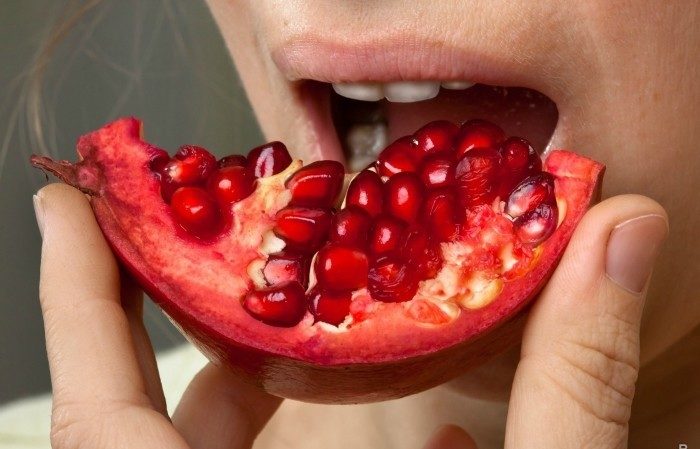
For diabetics
Diet for diabetes does not prohibit, and in some cases even recommends pomegranate. It is a product with a low glycemic index (35 units), it takes longer to digest, insulin is produced gradually, without overloading the pancreas and maintaining adequate blood glucose levels.
Pomegranate seeds are an additional source of fiber, which slows down the absorption of sugar from complex carbohydrates, restores disturbed carbohydrate, protein and lipid metabolism.
The benefits of pomegranate are obviouswhen diabetes has developed against the background of obesity. The main advantage of the fruit for weight loss is its low calorie content. Grains contain practically no fat, but they are rich in proteins and carbohydrates, which the body needs for saturation.
Possible harm and contraindications
The benefits and harms of pomegranate are associated with the presence of amino acids, which, when taken in excess, have an irritating effect on the mucous membranes of the digestive system. For this reason, pomegranate is contraindicated for people with gastrointestinal diseases, especially during the acute period. All the same organic acids and vitamin C, when consumed abundantly, destroy tooth enamel, increase the hypersensitivity of dental tissues to temperature and chemical irritants.
Attention! Pomegranate is a strong allergen. The consumption of grains or pomegranate juice in excess of the norm, especially in people with hypersensitivity to the product, threatens the development of an allergic reaction.
Among other contraindications to the use of pomegranate are severe renal, liver failure, severe urolithiasis, recent surgery on the digestive system, hemorrhoids.
How to eat pomegranate correctly

With health benefits, pomegranates can be eaten, both with bones and without. Those who do not have problems with the gastrointestinal tract can eat berries with seeds, chewing them thoroughly. If the bones are very hard (depending on the conditions cultivation, the degree of maturity of pomegranates), then it is better not to use them.
Pomegranate is eaten in its pure form, combined with other fruits and vegetables, dairy and sour milk products, lean meats, and seafood. Juice is also squeezed out of the fruit. This is a concentrated drink, so it is pre-diluted with water or any other vegetable or fruit juice in equal proportions. The water should be filtered, at room temperature. To preserve the tooth enamel, the juice should be drunk through a cocktail tube, and after each intake, rinse your mouth thoroughly with water.
Council. Freshly squeezed pomegranate juice cannot be stored, it must be drunk within 20-30 minutes after preparation. If it is necessary to extend the shelf life by 12-24 hours, the juice is poured into a glass sterile container and stored in a refrigerator with a closed lid.
How to clean

There are a few simple ways to peel a pomegranate neatly and quickly:
- The first way... Cut off the top with a sharp knife and open the pomegranate little by little, picking the grains with your fingers.
- Second way. Cut the fruit into two equal pieces. Lower one half over the crockery, cut down, and gently knock without effort with a spoon (kitchen spatula) until the grains fall out.
- Third way... Remove the top from the fruit, cut across into two equal parts and fill with water at room temperature. Leave the fruit for 5-10 minutes, then disassemble the pomegranate into grains directly in water. Transfer the grains to a colander to remove excess water.
What happens if there is a pomegranate every day

It depends on the daily rate, general health, in particular the digestive system, and the presence of other contraindications. It is undesirable to use pomegranate daily for children and persons who have been diagnosed with gastrointestinal diseases such as colitis, stomach and duodenal ulcers, gastritis. It is advisable to limit the amount of pomegranate with a tendency to low blood pressure, since berries reduce blood pressure.
In other cases, if the state of health allows, it is allowed to eat pomegranate every day, but within the normal range.
Daily rate
As such, there is no upper and lower limit. On average, it is enough for an adult healthy person to eat one medium-sized pomegranate or drink 200-300 ml of pomegranate juice without harm to health. If there are contraindications, the daily rate is reduced.
Best time of day to eat pomegranate
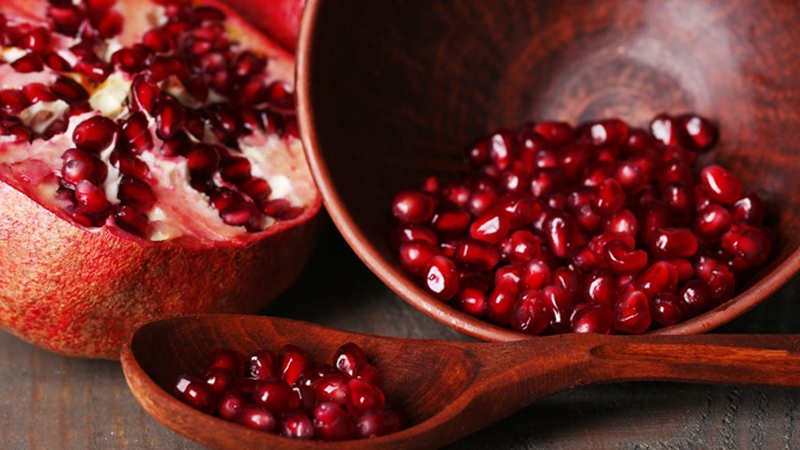
Pomegranate can be consumed in any meal - for breakfast, lunch, dinner, or in between meals throughout the day. It is more advisable to include pomegranate in the diet in the first half of the day. The fact is that the fiber containing in the composition quickly and for a long time satisfies the feeling of hunger, allowing you to reduce the volume of subsequent meals, to refuse snacks, which is especially important when losing weight. The composition contains complex carbohydrates that fill the body with energy, increase work capacity, and stimulate physical activity.
Nutritionists do not recommend pomegranate or pomegranate juice on an empty stomach. Reception on an empty stomach irritates the mucous membranes, which is manifested by increased fermentation, colic, a feeling of bloating, and in the presence of digestive problems - an exacerbation of symptoms.
Is it possible to eat at night
Nutritionists do not prohibit eat pomegranate at night, but in moderation. By itself, pomegranate satisfies hunger for a long time, while it has a low calorie content and is not deposited in the form of extra centimeters at the waist and hips. Due to the fact that fiber is digested for a long time, the last intake of the fruit should be no later than 2-3 hours before bedtime. During this time, the berries are completely absorbed without overloading the digestive tract.
For reference. Another argument in favor of the fact that pomegranate can be eaten at night is the presence of B vitamins in the composition, which soothe the nervous system and improve the quality of sleep.
At what age can you eat pomegranate

Safely grown without pesticides, pomegranate is good for men and women of all ages. Children are introduced to the fruit after a year. Initially, pomegranate juice is offered in limited quantities. Due to the fact that pomegranate has a high degree of allergenicity, it is necessary to introduce it into the diet in small quantities, starting from 1 tsp, observing the reaction of the body.
Important. Concentrated juice is contraindicated for a child. It is pre-diluted with purified water in equal proportions or with other fruit or vegetable juice that the baby has already tried.
Grains can be offered to children over two years old, but for this it is better to choose seedless varieties or with soft bones. It is important to make sure that the child does not eat the bones, as his digestive system is not able to completely digest the kernels.
There is no clearly established daily allowance for children. Without the risk of negative reactions, children from 2 to 3 years old can eat a quarter of a pomegranate, from 3 to 7 years old - half, over 7 years old - one medium-sized pomegranate.
How often can children eat pomegranate? It all depends on the state of the digestive system, contraindications and age. Pediatricians recommend including pomegranate in a child's diet no more than 2-3 times a week.
Is it possible to eat pomegranate with seeds
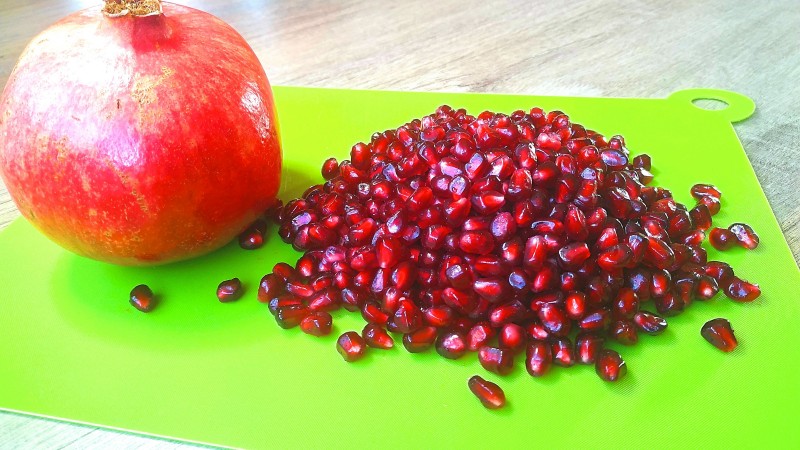
Is it okay to eat pomegranate with seeds? This is partly a matter of habit and everyone's taste. Bones are no less useful, and act as an additional source of fiber, vitamin E, vegetable fats. But they will only benefit in crushed form. Therefore, if you prefer to consume pomegranate with seeds, they must be thoroughly chewed.
What will happen if there is with bones
Chopped bones in moderation and, provided that there are no contraindications, will not harm health... But whole bones can cause inflammation of the appendix, intensify the symptoms of such chronic diseases from the digestive system as gastritis, colitis, gastric ulcer and duodenal ulcer.A hard woody shell irritates damaged mucous membranes and organs, which is manifested by soreness, increased gas production, and a feeling of bloating.
How much pomegranate with seeds is digested
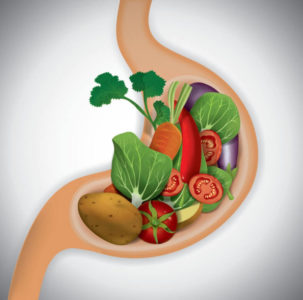
The pulp of the grains is quickly and well absorbed, in the stomach it is digested in 30-40 minutes, and the body spends 3-4 hours for complete digestion and absorption by cells. With bones, the situation is different. Fiber, which is contained in grains in large quantities, is difficult to react to gastric juice, which is why the body is not able to digest the nuclei, but only receives nutrients from them, and displays the grains themselves unchanged.
To facilitate the digestion of pomegranate seeds, nutritionists recommend thoroughly chewing the seeds and choosing varieties with soft seeds.
Conclusion
Due to its composition, pomegranate has anti-inflammatory, analgesic, tonic, antispasmodic, diuretic, bactericidal action, stimulates metabolism, strengthens immunity, relieves psychological stress. But its benefits directly depend on the quality of the fruit, growing and storage conditions, the amount of food eaten.